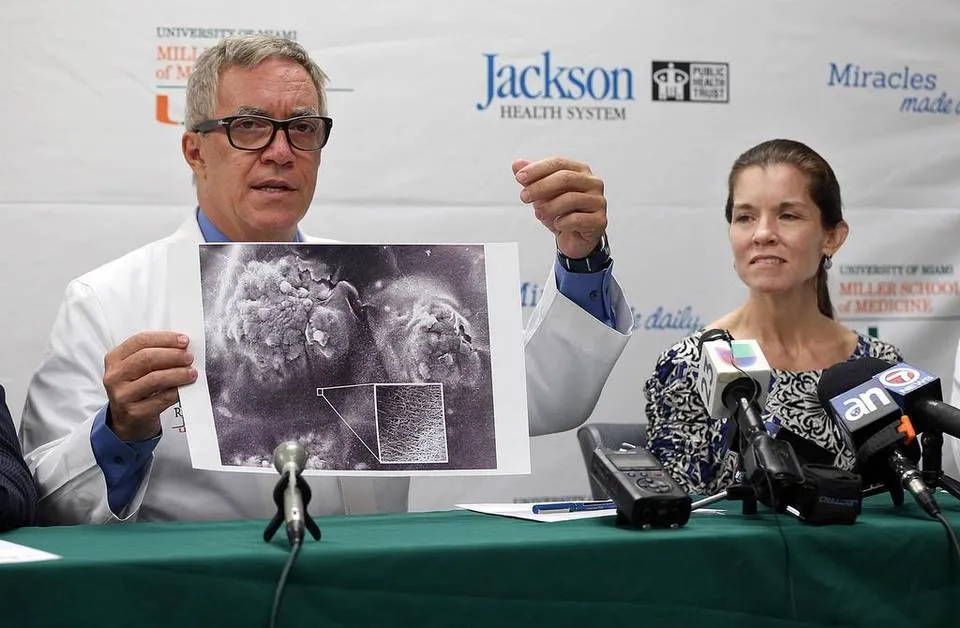After having lived with type 1 diabetes for more than two decades, Wendy Peacock was accustomed to the act of constant juggling that represented being aware of their blood sugar, taking insulin and paying attention to everything he ate.
But in recent weeks she could stop taking her insulin after doctors transplanted new cells as part of a clinical trial at the Institute of Diabetes Research (DRI) in UHEALTH, the health system of the University of Miami.
"To think that I can fall asleep at night without worrying if the blood sugar level will lower me, it is almost as if they had taken a weight off me," Peacock said on Wednesday at a press conference where doctors gave toKnow the story of your success.
Video: Diabetic woman Beneficia of cell transplantation - no longer needs insulin
See video: Link
In the case of those suffering from type 1 diabetes, the body's immune system destroys the cells that produce insulin, the hormone that is needed to regulate blood sugar.Around 1.25 million Americans suffer from type 1 diabetes, including 200,000 young people.Those who suffer from the disease have to inject insulin, either through multiple injections or continuously with a pump.They have to measure the level of glucose in their blood by clicking their fingers multiple times a day.
Researchers are studying a new Langerhans cell transplant technique, which are groups of thousands of cells in the pancreas that produce insulin to regulate the blood sugar level.Doctors implemented Langerhans cells within a biodegradable scaffolding in the epiplón, a kind of tissue apron that covers the abdominal organs, to determine if this would be a more viable location than the liver, where many of the implanted cells do not survive.
The doctors transplanted the cells during a laparoscopic operation at the Jackson Memorial Hospital on August 18.The study, approved by the FDA, is a progress step towards the development of the so -called Dri biohub, a mini biodesigned organ that will work as the pancreas to restore the natural production of insulin in people with type 1 diabetes.
From the transplant, Peacock's glucose has remained at a healthy level, and withdrew insulin and all dietary restrictions.
"She is like a non -diabetic person, but she needs drugs against tissue rejection," said Dr. Camillo Ricordi, director of the DRI."When you can do it without anti -suppression, then it will be a cure."
Peacock said it has not experienced side effects as a consequence of drugs.
So, will it start eating ice cream now?
"I have been wearing a strict diet for 26 years," said Peacock, 43."I don't know if I will try the ice cream."
Previously, diabetes ruled Peacock's life.She is a legal consultant who lives with her parents and her 5 -year -old son in San Antonio.
"It is an act of constant juggling," he said.“It's always there.I lived with that constantly. ”
Peacock described how, when the sugar lowered, he felt as if he were in a mist and was difficult to process things and think logically.Peacock developed a condition in which he no longer realized if his sugar lowered, a fairly dangerous situation.
In February 2014, Peacock came to Miami to do tests for the clinical trial, and discovered that it was eligible.On August 16, she traveled to Miami with her father and was admitted to the Jackson for the operation.
"Since then, it has been everything like a whirlpool," he said.“Of course, I was scared, excited andFull of hope. ”
Peacock plans to return to San Antonio this month, and there will continue his life, but without insulin.That will make your daily life much easier, he said.You will no longer have to maintain a mental list around checking the blood in the blood.For example, if you want to go running, you can simply put the tennis and go out without worrying about finding out if you have to eat something first.
Ricordi transplanted the cells in collaboration with Dr. Rodolfo Alejandro, endocrinologist and director of the DRI cell transplantation clinical program;Dr. Gaetano Ciancio, surgeon at Uhealth and director of Urological Transplant Surgery;and Dr. Jose Martínez, Laparoscopic surgeon of Jackson.The team collaborates with other doctors globally, and is hoping to make between 20 and 30 more transplants of this type in the remainder of the year, some of them in the Jackson.
Ricordi told Miami Herald last year that he predicted that, within three to seven years, there would be a cure for type 1 diabetic patients.
“It is not a prediction;It is a promise that I make to patients.We are going to defeat this disease, that's safe, ”Ricordi told Herald in November."Depending on how many obstacles we find, and regulatory complexities and cost, that can take more than 10 years, but we are coming."
Source: Link








